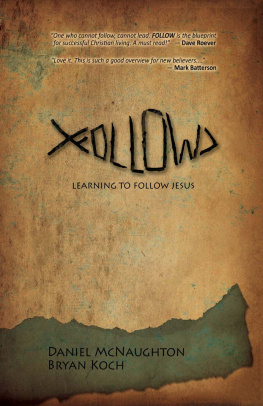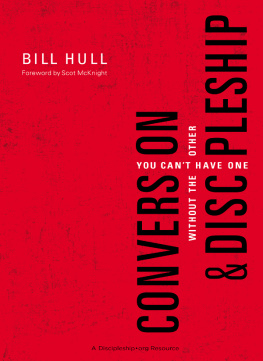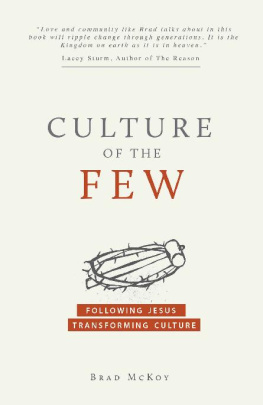W HEN J ESUS WALKED along the shore of the Sea of Galilee, he called to four fishermen, Come, follow me, and I will make you fishers of men. Peter, Andrew, James, and John dropped their nets and followed him. Their lives and indeed, the whole world were never the same.
But Jesus call to follow him was not for them alone. His call has also come to each of us: Will you follow him?
This call to follow Jesus is not one we can easily ignore. It can be tempting in the midst of our busy lives to set it aside, to shrug off the claims that Jesus made, and to go about with business as usual. It can be equally tempting to look at what we see as the failures of those who have claimed Jesus name or at our past experiences and assume that weve already evaluated all there is to know about Jesus. Been there, done that.
But the nature of Jesus claims and his invitation to follow him demand our full attention. Jesus said, I am the way and the truth and the life. No one comes to [God] the Father except through me. Peter, one of the four fishermen Jesus called, later said of Jesus, Salvation is found in no one else, for there is no other name under heaven given to men by which we must be saved. Jesus did not claim to be one dish on the buffet line of spirituality from which we can pick and choose the elements that best suit our taste. And if his claims are true, then his call demands everything, and we have no other choice like those fishermen before us but to drop everything and follow him.
In this booklet, I aim to set before you what it means to follow Jesus. What is his call? What does it cost? And what does a life of following Jesus entail? These questions deserve careful consideration.
Ultimately the call to follow Jesus is a call to die to die to ourselves and to die to the things of this world. But at the same time, it is a call to live to experience unbridled joy as we follow Jesus wherever he leads in this world. The four fishermen knew this, and they gave their lives to follow him.
CHAPTER 1
THE GREAT INVITATION
F OLLOW ME....
Jesus call to the fishermen seems obvious in that context: they dropped their nets and followed him. They physically walked around with him wherever he went. And after Jesus death and resurrection, they followed him by imitating his way of life and spreading the good news about what he had accomplished in his time on earth. But what does it mean for us to follow Jesus today?
First, it means dealing with our most fundamental problem before God. Our problem as people is not simply that we have made some bad decisions in our lives. Our problem is not just that weve messed up in this world. Our problem is that we are all at the very core of our being rebels against God. This rebellion is what the Bible calls sin, and it keeps us from God.
A perusal through the pages of Scripture shows severe punishment toward sin and sinners alike. Lots wife disobeys God by looking back as Sodom and Gomorrah are destroyed and loses her life. God commands the Israelites to do no work on the Sabbath, and a man is put to death for gathering firewood on that holy day. Achan and his family are put to death for keeping plunder that the Lord said should be destroyed. And there are many more examples.
Many people read stories like these in Scripture and walk away confused. After all, as the Bible says elsewhere, isnt God a God of love? Arent these punishments for sin a bit severe? Annihilated for looking backward? Stoned for picking up sticks?
Such questions, though honest, reveal a fundamental problem with our perspective. We naturally view sin through man-centered eyes. We cannot imagine responding this way if the offenses were against us. When people do something we have asked them not to do, we dont conclude that they should die.
Yet the penalty for sin is not determined by our measure of it. Instead, the penalty for sin is determined by the magnitude of the one sinned against. If you sin against a log, you are not very guilty. On the other hand, if you sin against a man or a woman, then you are absolutely guilty. And ultimately, if you sin against an infinitely holy and eternal God, you are infinitely guilty and worthy of eternal punishment.
Azeem, an Arab follower of Jesus and a friend of mine, was talking recently with a taxi driver in his country. The driver believed that he would pay for his sin for a little while in hell, but then he would surely go to heaven after that. After all, he hadnt done too many bad things.
So Azeem said to him, If I slapped you in the face, what would you do to me?
The driver replied, I would throw you out of my taxi.
If I went up to a random guy on the street and slapped him in the face, what would he do to me?
He would probably call his friends and beat you up.
What if I went up to a policeman and slapped him in the face? What would he do to me?
You would be beat up for sure, and then thrown into jail.
And what if I went to the king of this country and slapped him in the face? What would happen to me then?
The driver looked at Azeem and awkwardly laughed. He told Azeem, You would die.
The driver got Azeems point and realized that he had been severely underestimating the seriousness of his sin against God.
Dead in Our Sin
Our sin problem is not isolated to one or two instances; it goes to the very core of who we are and makes us utterly unable to turn to God on our own. This is what the Bible means when it says we are dead in sin. When Paul wrote to the Ephesian Christians and said, You were dead in your transgressions and sins, in which you used to live, he meant that they were completely dead. Not partially dead. Not almost dead. Not halfway dead. Not kind of dead. Completely dead.
So if sin is our problem and we are completely dead because of it, what does that mean? How can we help ourselves or even ask for help? How can people who are dead ask someone else to give them life? When a mans heart is flatlined, does he invite people to resuscitate him? No. These things are impossible for those who are dead. In your death, you need someone else, completely outside of you, to call you to life and enable you to live.
And thats exactly what Jesus has done.
Jesus came to live the life we could not live (that is, a life without sin) and to die the death that we, as sinners, deserve to die. We have already seen that even one sin before an infinitely holy and eternal God warrants infinite and eternal punishment. And this is why Jesus came: to endure the holy wrath of God due us as sinners.
















